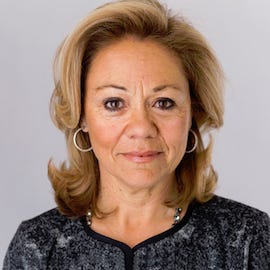Cybersecurity expert Alex Stamos joins Stanford University as fellow
Stamos joins the Hoover Institution and the Center for International Security and Cooperation at the Freeman Spogli Institute for International Studies. Former Facebook chief security officer, Alex Stamos, to bring rich real-world perspective on cybersecurity and technology policy.
Stanford University’s Freeman Spogli Institute for International Studies and the Hoover Institution announced today the appointment of Alex Stamos as a William J. Perry Fellow at the Center for International Security and Cooperation (CISAC), Cyber Initiative fellow, and Hoover visiting scholar.
Stamos, a computer security expert and the outgoing chief security officer at Facebook, will engage in teaching, research and policy engagement through CISAC and the Hoover Institution's Cyber Policy Program as well as the Stanford Cyber Initiative. Drawing on his considerable experience in the private sector, he will teach a graduate level course about the basics of cyber offense and defense to students without technical backgrounds as part of the Ford Dorsey Master’s in International Policy program at the Freeman Spogli Institute, which houses CISAC.
"With our country facing unprecedented challenges in digital interference with the democratic process and numerous other cybersecurity issues, Alex’s experience and perspective are a welcome addition to our group of fellows,” said Freeman Spogli Institute Director Michael McFaul.
In his role, Stamos will also engage in research projects aimed at public policy initiatives as a member of the Faculty Working Group on Information Warfare. The working group will develop, discuss and test concepts and theories about information warfare, as well as conduct applied research on countermeasures to identify and combat information warfare. The working group will also develop policy outreach in briefings to government officials, public seminars and workshops, Congressional testimony, online and traditional media appearances, op-eds and other forms of educating the public on combatting information warfare.
“We are thrilled that Alex is devoting even more energy to our cyber efforts,” said CISAC Co-Director Amy Zegart. “He's been a vital partner to the Stanford cyber policy program for several years and his Stanford "hack lab"--which he piloted in Spring 2018--is a cutting-edge class to train students in our new master’s cyber policy track. He brings extraordinary skills and a unique perspective that will enrich our classes, research, and policy programs."
Over the past three years, the Hoover Institution and CISAC have jointly developed the Stanford Cyber Policy Program. Its mission is to solve the most important international cyber policy challenges by conducting policy-driven research across disciplines, serving as a trusted convener across sectors, and teaching the next generation. The program is led by Dr. Amy Zegart and Dr. Herbert Lin. Stamos has participated on the advisory board of the program since its inception.
“We look forward to working with Alex on some of the key cyber issues facing our world today," said Tom Gilligan, director of the Hoover Institution. "He brings tremendous experience and perspective that will contribute to Hoover’s important research addressing our nation’s cyber security issues.”
“I am excited to join Stanford and for the opportunity to share my knowledge and expertise with a new generation of students--and for the opportunity to learn from colleagues and students across many disciplines at the university,” said Stamos.
A graduate of the University of California, Berkeley, Stamos studied electrical engineering and computer science. He later co-founded a successful security consultancy, iSEC Partners, and in 2014 he joined Yahoo as its chief information security officer. Stamos joined Facebook as chief security officer in June 2015, where he led Facebook’s internal investigation into targeted election-related influence campaigns via the social media platform.
###
About CISAC: Founded in 1983, CISAC has built on its research strengths to better understand an increasingly complex international environment. It is part of Stanford's Freeman Spogli Institute for International Studies (FSI). CISAC’s mission is to generate knowledge to build a safer world through teaching and inspiring the next generation of security specialists, conducting innovative research on security issues across the social and natural sciences, and communicating our findings and recommendations to policymakers and the broader public.
About the Hoover Institution: The Hoover Institution, Stanford University, is a public policy research center devoted to the advanced study of economics, politics, history, and political economy—both domestic and foreign—as well as international affairs. With its eminent scholars and world-renowned Library & Archives, the Hoover Institution seeks to improve the human condition by advancing ideas that promote economic opportunity and prosperity and secure and safeguard peace for America and all mankind.
About the Stanford Cyber Initiative: Working across disciplines, the Stanford Cyber Initiative aims to understand how technology affects security, governance, and the future of work.
Media contact: Katy Gabel, Center for International Security and Cooperation: 650-725-6488, kgabel@stanford.edu



